Religion / History
I take History to mean everything the human has every thought of himself – even when his own actions have been deeply mysterious to him. Sometimes he has spoken his thoughts to others and they have traveled by word of mouth, sometimes he has written them (on parchment and later paper), and today he “publishes” to the world at large. So History is a mine of thought, its changing sorrows a pageant of the heartbreaking and crass, the tragic and the beautiful.
In my first year at Oxford I knew I wished to devote myself to this strange study, especially to its modern period, which was apparently after the “medieval” period. Historians invented all these strange time-categories for us quite as if human life was on the bubble all the time. It also seemed that historians were quite powerful people, starting in ancient Greece with Herodotus (“The Father of History”). Whose book was aptly enough all about human war.
‘I was well aware that one historian could flatly contradict another even about an event recalled by everybody. Take British historians on the bitter argument about the “Enclosures” at the end of the eighteenth century, namely the wild or “common” land where the poorest could traditionally graze their cattle. That ancient right was gradually stolen by the rich. So it depended on where you the historian belonged socially – to the “upper” or less “upper” class.’
‘To my astonishment I learned more History from Philosophy than I could believe. Philosophy asked me to consider what I meant by the word “facts”, namely what History is all about. It asked me even more severely what I meant by “indisputable” facts, since anything and everything was open to dispute. “Truth”, “reasoning” “analysis” – all the things claimed by History – were drawn from the study of Logic, which again belongs securely in Philosophy.’
‘What is this civilization that divides us so deeply from each other – not only the living from the dead but the living from the living?... The first thing I discovered when I asked this question was that all the civilizations we know about are known to us by their religions. We know of no civilization that was not preceded by a religion, of which that civilization was the community.’
Lorenzo the Magnificent
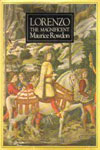
Weidenfeld and Nicolson – 1974
The Renaissance brought with it immense hopes for man’s potential, and yet at the same time bore within itself a deadly contradiction – enlightment did not abolish wars or make men intrinsically better.
Excerpt
Lorenzo de Medici was twenty-one when he took over the government of Florence in December 1469. He was none to anxious to inherit from his father a ‘throne’ which was no throne at all, nor even an official position. The Florentines were an ungrateful lot, and it seemed much easier to remain a rich, popular and astonishingly gifted young man, known to every prince in Europe as the inheritor of the Medici millions and the most princely patron of thought and art in Christendom. It was a touch decision, and one he had to make within a day of his father Piero’s death. He knew too that most likely he himself would one day die of the same hereditary disease, gout, and that hard work and worry would make an early death probably. And he did die, worn out and crippled, at the age of forty-three. [Download PDF more... ]
Spanish Terror: Spanish Imperialism in the Sixteenth Century
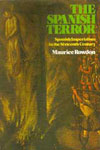
St Martin’s Press NY – 1974
How today’s insoluble global problems came into being
Review
Excerpt
‘The sixteenth century was for Europe an epoch of fervent business, persecution and war. In that time the modern world as we recognise it came into being. Things changed faster than ever before and perhaps ever since. Even the industrial nineteenth century was less original in its changes; the basis of the work had been done three centuries before. For some people ‘the sixteenth century’ means the beginning of Christian civilisation proper. They see the Middle Ages as a kind of passive incubation period, dominated and repressed by the Church, before the great liberating forces (called the ‘Renaissance’) which brought about renewed trade, voyages of discovery, new techniques of manufacture and the chastening of Rome. [Download PDF more... ]
The Fall of Venice or The Silver Age of Venice
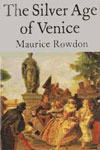
Weidenfeld and Nicolson – 1970
The Silver Age of Venice
Reviews
Reviews
Excerpt
‘Being a woman in Venice was a profession. She had to set the Serenissima off, be its prise and consolation; a woman changed according to the state of the Republic and the male tastes that happened to prevail. Whether these corresponded to her own choice, much less her own happiness, had no importance, It was a wonder that a clever woman could survive in Venice; but there were a few, especially in the eighteenth century when she was a pleasure-symbol and no longer the remote doll she had been a century before, strutting along on stilts, the bearer of family prestige and talking to no one. She was beguiling now, with ‘occhio lascivo in ziro e seducente, sedizioso el parlar, sia brute o bele’
Companion Guide to Umbria
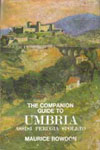
Collins – 1969
Reviews
A Roman Street
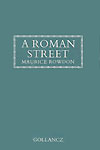
Gollancz – 1964
Reviews
Excerpt
Sometimes at night there was a sudden, astonishing silence, when for a few seconds the city seemed not to move and only the leaves on the trees by the river stirred, and a cat mewed in the courtyard. Below. Then the bitter racket would start again in the distance – someone would sound his car-horn imperiously, lost in his little world of sensations, there would be the roar of an engine, a shout. Then there might be an invasion of boys, whistling, throwing a ball – sometimes throwing a cart; they used to pick up a stray cat and throw it in each other’s faces. You hardly ever see that now. Partly the police tightened up, partly television and more money and more cars softened manners. People stare at each other less. There isn’t the old leisurely, southern stare. [Download PDF more... ]
Italian Sketches
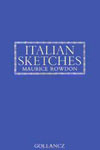
Gollancz – 1963
Reviews
Excerpt
‘He was a small, plump, harassed man, untidily dressed, with frightened eyes, while his wife was sallow and robust-looking, with a dark and level gaze. They both came from the Abruzzi, in the mountains. There was an odd cultivation about him, something delicate and ancient, though fallen into softness and degeneracy. ’
Of Sins and Winter
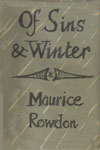
Chatto & Windus &ndash London 1955
Reviews
Excerpt
In war it is easy for people to die, even the wise and ageless and infallible. The world is prolific with dying. It is easy for buildings to fall to the ground, even the eternal ones with the important frown. The women we loved starve in camps, the churches where we prayed are canteens, and the villages of our truancy become silly. By the time it is over the sacred and eternal things are no longer there. Do not say sacred and eternal. The words sacred and eternal are ridiculous. They do not belong to your world. Your religion is dead, and as for eternity, war is the shadow that constantly falls on your sleeve. If you still believe in the sacred and eternal you are only turning the other way; when you look back you will see the shadow still there on your sleeve. [Download PDF more... ]
Hellebore the Clown
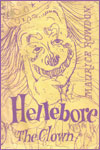
Chatto & Windus – London 1953
A professional clown’s guilty encounter with his dead son’s closest friend, who had watched him die on the battlefield.
Religion/History: Unpublished
Sophia the Wild
Incarcerecstacy
The Indian Crucifixion 1974
‘He who believes in the devil believes in God, he who does not, is.’
BLURB: ‘Barbarian preliminaries’ imply minimal energy in the human being, civilization optimum energy. For this reason all forms of barbarism, from the tribal to the highly sophisticated or intellectrual, rely on this clamour and much movement, because physical action is the barbarian’s definition of energy-release. Yet in ‘deep’ meditation the body throws out more powerful currents than during the most active waking state. In this present epoch of barbarian revsersion ‘pageant science’, with its manifold explosions and spectacular flights, provides part of the clamour. The round-the-clock media supply part of it too, bombarding the atmosphere with visual and oral signs of activity, and rendering millions upon millions of people more passive than human beings have ever been. The body, cut off from its early tribal releases, now becomes an inert organ eligible for medical care and hospitalization, passively reacting to drugs, barely aware even of its own needs.
